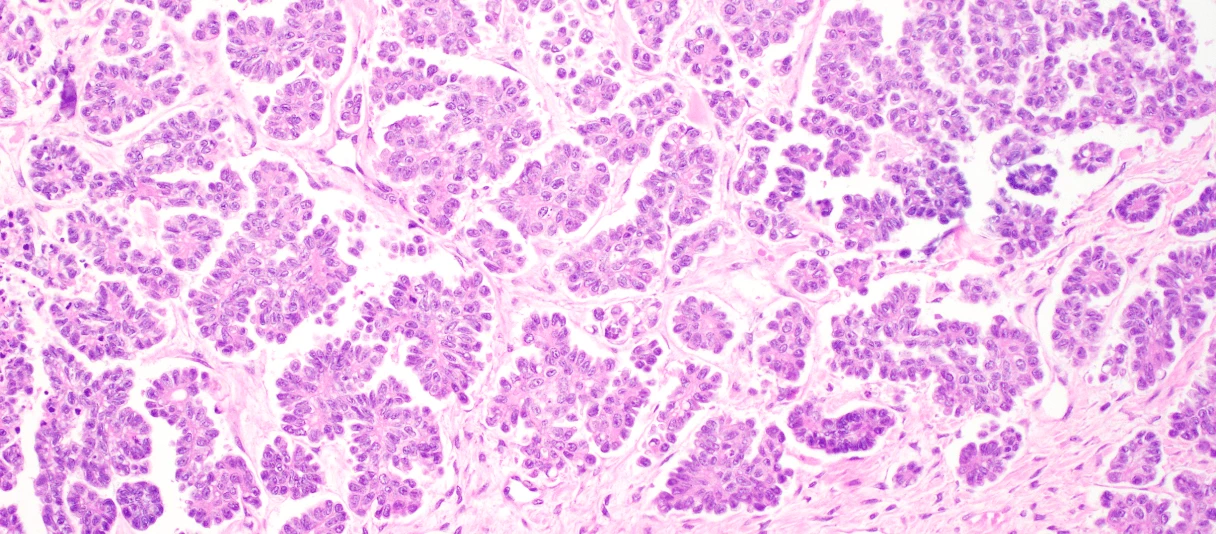

What you should know about
LGSOC
LGSOC is a rare ovarian cancer.6 LGSOC is characterized by:
LGSOC is molecularly and histopathologically distinct and clinically different from HGSOC.5,12 The complex biology and signaling pathways of LGSOC distinguish it from HGSOC, and underlie the differences in their clinical course and overall prognosis.13

Signs and symptoms of LGSOC are nonspecific
Because signs and symptoms of LGSOC are nonspecific, patients may be misdiagnosed, and accurate diagnosis of LGSOC can be significantly delayed.14,15 In fact, ~90% of patients are diagnosed with LGSOC in an advanced stage.5,16
LGSOC may be misdiagnosed.10 As the disease progresses, most patients experience severe pain and complications.14,17 Patients may suffer for years from ineffective treatments and a diminishing quality of life.18
LGSOC affects a younger patient population and can disproportionately impact health, fertility, and long-term quality of life.16,18,19
Unmet needs in
Treatment of LGSOC
A particular challenge in the treatment of LGSOC is relative resistance to
chemotherapy compared to HGSOC.8 These patients are often diagnosed at later stages of disease10 and
are at high risk for recurrence:
Over 80%
of patients with LGSOC will experience a recurrence4,9
~90%
of patients are diagnosed with LGSOC in an advanced stage.5,16
With no specific FDA-approved treatment options,20 LGSOC can be an overwhelming diagnosis and the beginning of a very long patient journey.18
What’s ahead?
Emerging treatment options
The assessment of several investigational approaches for LGSOC treatment are currently underway. An area of active research: approaches directed at inhibiting multiple nodes in the mitogen-activated protein kinase (RAS/MAPK) pathway.21

Resources for
you and your
patients
A robust set of materials is available based on the current evidence and publications.
- Diagnosis and Management of Low-Grade Serous Carcinoma
- View videos such as Experts and Patient Advocates Discuss LGSOC
- Gadducci A, Cosio S. Therapeutic approach to low-grade serous ovarian carcinoma: state of art and perspectives of clinical research. Cancers. 2020;12:1-13. doi:10.3390/cancers12051336.
- Gershenson DM. Trametinib versus standard of care in patients with recurrent low-grade serous ovarian cancer (GOG 281/LOGS): an international, randomised, open-label, multicentre, phase 2/3 trial. Lancet. 2022;399(10324):541-553. doi:10.1016/S0140-6736(21)02175-9
- Monk BJ, Grisham N, Banerjee S, et al. MILO/ENGOT-ov11: binimetinib versus physician’s choice chemotherapy in recurrent or persistent low-grade serous carcinomas of the ovary, fallopian tube, or primary peritoneum. J Clin Oncol. 2020;38:3753-3762. doi:10.1200/JCO.20.01164
- Gershenson DM, Bodurka DC, Lu KH, et al. Impact of age and primary disease site on outcome in women with low-grade serous carcinoma of the ovary or peritoneum: results of a large single-institution registry of a rare tumor. J Clin Oncol. 2015;33:2675-2682. doi:10.1200/JCO.2015.61.0873
- Vang R, Shih IeM, Kurman RJ. Ovarian low-grade and high-grade serous carcinoma: pathogenesis, clinicopathologic and molecular biologic features, and diagnostic problems. Adv Anat Pathol. 2009;16(5):267-282. doi:10.1097/PAP.0b013e3181b4fffa
- Babaier A, Mal H, Alselwi W, et al. Low-grade serous carcinoma of the ovary: The current status. Diagnostics (Basel). 2022;12(2):458. doi:10.3390/diagnostics12020458
- Ali RH, Kalloger SE, Santos JL, et al. Stage II to IV low-grade serous carcinoma of the ovary is associated with a poor prognosis: a clinicopathologic study of 32 patients from a population-based tumor registry. Int J Gynecol Pathol. 2013;32(6):529-535.
- Grabowski JP, Harter P, Heitz F, et al. Operability and chemotherapy responsiveness in advanced low-grade serous ovarian cancer. An analysis of the AGO Study Group metadatabase. Gynecol Oncol. 2016;140:457-462. doi:10.1016/j.ygyno.2016.01.022
- Gershenson DM, Cobb LP, Westin SN, et al. Contemporary primary treatment of women with stage II-IV low-grade serous ovarian/peritoneal cancer (LGSOC): determinants of relapse and disease-free survival. Gynecol Oncol. 2022;167(2):139-145. doi:10.1016/j.ygyno.2022.09.005
- Malpica A, Deavers MT, Lu K, et al. Grading ovarian serous carcinoma using a two-tier system. Am J Surg Pathol. 2004;28(4):496-504. doi:10.1097/00000478-200404000-00009
- Grisham RN, Slomovitz BM, Andrews N, et al. Low-grade serous ovarian cancer: expert consensus report on the state of the science. Int J Gynecol Cancer. 2023;33(9):1331-1344. doi:10.1136/ijgc-2023-004610
- Matsuo K, Machida H, Grubbs B, et al. Trends of low-grade serous ovarian carcinoma in the United States. J Gynecol Oncol. 2018;29(1):e15. doi:10.3802/jgo.2018.29.e15
- Plaxe SC. Epidemiology of low-grade serous ovarian cancer. Am J Obstet Gynecol. 2008;198(4):459.e1-8; discussion 459.e8-9. doi:10.1016/j.ajog.2008.01.035
- Certain symptoms may be early signs of ovarian cancer. Harvard Health. Accessed May 3, 2024. https://www.health.harvard.edu/cancer/certain-symptoms-may-be-early-signs-of-ovarian-cancer
- Gockley A, Melamed A, Bregar AJ, et al. Outcomes of women with high-grade and low-grade advanced-stage serous epithelial ovarian cancer. Obstet Gynecol. 2017;129:439-447. doi:10.1097/AOG.0000000000001867
- De Decker K, Wenzel H, Bart, et al. Stage, treatment and survival of low-grade serous ovarian carcinoma in the Netherlands: a nationwide study. Acta Obstet Gynecol Scand. 2023;102:246-256. doi: 10.1111/aogs.14518
- Alcid J, Shahin MS. Low-grade serous carcinoma of the ovary: a case series and literature review. J Case Rep Images Oncol. 2018;4:100052Z10JA2018. doi:10.5348/100052Z10JA2018CS
- Slomovitz B, Gourley C, Carey MS, et al. Low-grade serous ovarian cancer: State of the science. Gynecol Oncol. 2020;156(3):715-725. doi:10.1016/j.ygyno.2019.12.033
- Sun CC, Andrews N, Ludemann J, et al. Voices of women with low-grade serous ovarian cancer: results from a multinational survey. MD Anderson Cancer Center. Poster #2269.
- Banerjee SN, Ring KL, Nieuwenhuysen EV, et al. Initial efficacy and safety results from ENGOT-ov60/GOG-3052/RAMP 201: a phase 2 study of avutometinib (VS-6766) ± defactinib in recurrent low-grade serous ovarian cancer (LGSOC). J Clin Oncol. 2023;41:(16_supp). Poster 5515.
- Manning-Geist B, Gordhandas S, Liu YL, et al. MAPK pathway genetic alterations are associated with prolonged overall survival in low-grade serous ovarian carcinoma. Clin Cancer Res. 2022;28(20):4456-4465. doi:10.1158/1078-0432.CCR-21-4183



